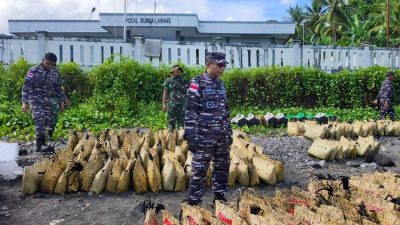As Morocco prepares to host the
2030 FIFA World Cup
, recent British media coverage has drawn international attention to a national problem: stray dogs.
The story broke internationally through a cluster of British outlets, including the BBC, Daily Mail, and The Sun, with allegations of a mass government-led cull of stray dogs to “clean up” cities before the tournament.
While the BBC adopted a more restrained tone, framing the issue around the emotional testimony of Saffron Dixon, a British woman who runs a small shelter, tabloids leaned heavily into graphic language and imagery, with headlines invoking “
slaughter
” and “
massacre
,” often accompanied by photos of dead dogs and devastated expatriates.
Moroccan voices were largely absent. Most reports relied on foreign NGO workers and British residents, offering limited input from local activists or government officials.
Even Morocco’s existing TNVR program, launched in 2019, was either mentioned in passing or portrayed as ineffective.
EN reached out to the Daily Mail for comment on its reporting but did not receive a response.
The visual framing, wounded animals, emotional foreigners, and dramatic captions, effectively collapsed a nuanced domestic issue into a global outrage cycle.
On social media, these narratives spread quickly, amplifying anger but leaving little room for complexity. “There are over 600 million stray dogs globally,” said Salima Kadaoui of SFT Sanctuary in Tangier. “But the spotlight is fixed on Morocco.”
A frequent claim in foreign headlines is that “three million dogs” are set to be killed before 2030. Salima Kadaoui, founder of SFT Sanctuary in Tangier, rejects this narrative and says the figure instead corresponds to the estimated total stray dog population in the country.
“A question could be asked: ‘How was 3 million estimated?’ For that number to be killed over five years, you’d be seeing hundreds killed every day. Reports are of one or two, or even a few. That’s not 3 million.”
Augsburger, who runs the Sunshine Animal Refuge Agadir (SARA), agrees. “It’s completely false and scandalous to write that Morocco will kill 3 million dogs. These figures were given by agitators to discredit Morocco.”
Although both confirm that culls continue in some areas, they say that it is not a national policy.
The Moroccan
government
has also rejected such claims. Mohamed Roudani, an official at the Ministry of Interior, told the state-run MAP agency that “there is no campaign to eliminate stray dogs,” describing reports of a planned three million dog cull as “entirely unfounded.”
Viewed regionally, Morocco occupies a middle ground. Its estimated stray dog population, between 1.2 and 3 million, is dwarfed by Egypt’s 15 to 30 million, where no unified national strategy exists and local responses vary wildly. Turkey, meanwhile, has taken a hardline turn, legalizing euthanasia in a move that triggered widespread protests.
Morocco’s model falls somewhere in between: more coordinated than Egypt’s, less aggressive than Turkey’s, and officially centered on Trap-Neuter-Vaccinate-Return (TNVR) programs.
Yet of all the criticisms surrounding Morocco’s World Cup preparations, the stray dog issue has proven to be the most visible and emotionally charged, amplified by foreign media and standing out in an otherwise muted landscape of scrutiny.
For some Moroccan animal welfare advocates, the media storm, though exaggerated and uneven, has done what years of domestic advocacy could not: force the issue into the national spotlight.
“We’ve tried for years to raise awareness at home. But when authorities don’t listen, you have no choice but to sound the alarm internationally, not to harm, but to help,” The Moroccan Society for the Protection of Animals told EN in a statement.
Augsburger, who has worked with both local and national officials since 2014, said that media pressure had already helped slow killings in some areas and encourage broader reforms.
“Perhaps this campaign will help push the authorities to change their methods and to ensure that TNVR is actually implemented throughout the Kingdom,” she said.
The government officially adopted the National Stray Animal Control Strategy in 2019, aiming to control stray animal numbers while reducing the spread of rabies.
The Moroccan Society for the Protection of Animals says it has held hundreds of meetings with government departments, governors, and local officials to promote humane reforms.
“Our proposals include national animal protection legislation, the creation of shelters, awareness campaigns, and digital tracking of sterilized dogs,” the group said.
Still, challenges remain. “Dialogue exists, but it’s often a dialogue of the deaf,” the Society remarked, “Some local authorities continue to pursue short-term, populist strategies that ignore international best practices.”
Augsburger echoes the need for long-term thinking: “Only by working with the Moroccan people and government can we change the approach to animal welfare.”
Moroccan activists agree that international pressure has helped accelerate reforms. “This media coverage has raised public awareness, exerted pressure for change, and opened the door to a broader discussion,” the Moroccan Society for the Protection of Animals noted.
For Kadaoui, the solution is clear: “There is only one solution, humane reduction of the homeless animal population through CNVR. Morocco has what it takes to be the role model country where animals and humans live in harmony.”
“I want Morocco to be the role model country where humans and animals live without fear of disease or dog bites. Morocco can do it and will. Then we will be the best country worldwide where everyone is protected,” she said.
The post
British coverage on stray dogs in Morocco is messy and misleading but gives activists a rare opening
appeared first on
English – Morocco News
.













